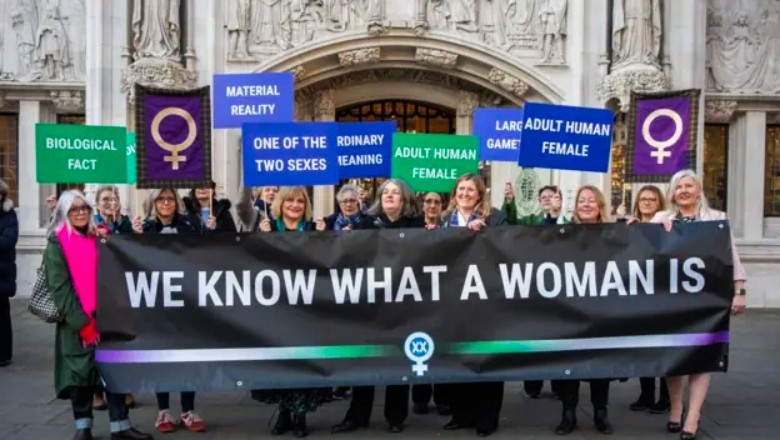‘Trans women are not legally women:’ says UK’s Supreme Court in landmark ruling

Web Desk
|
17 Apr 2025
In what is being hailed as a major victory for gender-critical campaigners, the United Kingdom’s Supreme Court unanimously ruled that trans women cannot be legally identified as "women" under the country’s equality law.
The court maintained that the term "woman" in the Equality Act 2010 refers to a biological woman, and that legal protections associated with sex discrimination are based on biological sex, not gender identity.
The ruling has raised concerns among the transgender community regarding their legal status and protections in society.
In the UK, transgender individuals can obtain a Gender Recognition Certificate (GRC), which legally changes their gender to female.
Read: Pentagon plans to discharge transgender service members
This certificate had previously allowed trans women to access rights and protections intended for women under the Equality Act.
The legal dispute arose after the Scottish government attempted to increase the number of women on corporate boards by counting GRC-holding trans women as women under equality law.
In response, the gender-critical group For Women Scotland (FWS) initiated a legal action, arguing that such an interpretation would dilute the protections intended specifically for biological women.
FWS maintained that expanding the definition of "woman" to include trans women could impact the integrity of single-sex spaces such as changing rooms, hostels, and communal accommodations.
“The terms ‘woman’ and ‘sex’ in the Equality Act 2010 refer to a biological woman and biological sex,” Lord Patrick Hodge said in his statement. “The provisions relating to sex discrimination can only be interpreted as referring to biological sex,” he added.
Check: Trump bans transgenders from serving in US military
On Wednesday, the court ruled in favour of FWS, declaring that interpreting "sex" based on GRCs would result in legal inconsistencies. The summary of the judgment stated, “Interpreting ‘sex’ as certificated sex would cut across the definitions of ‘man’ and ‘woman’ and thus the protected characteristic of sex in an incoherent way.”
The ruling further clarified that transgender women may be excluded from same-sex spaces,such as changing rooms, if it is deemed proportionate and legally justified.
Lord Hodge also noted that giving trans women with a GRC the same sex-based protections as biological women could lead to unintended legal consequences, such as them acquiring “greater rights than those who do not,” particularly in relation to provisions like pregnancy and maternity leave.
However, the court emphasised that the ruling only interprets the definition of sex under the Equality Act 2010. It does not remove other legal protections for transgender people.
Gender-critical campaigners welcomed the ruling, with members of the Conservative Party calling it a “clear victory for common sense.” They urged the UK government to update official guidance in light of the decision.
A spokesperson for the British government responded by affirming that the Labour Party “has always supported the protection of single-sex spaces based on biological sex.”
“This ruling brings clarity and confidence to women and service providers such as hospitals, refuges, and sports clubs,” the spokesperson added. “Single-sex spaces are protected in law and will always be protected by this Government.”












Comments
0 comment